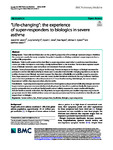"Life-changing”- the experience of super-responders to biologics in severe asthma
| dc.contributor.author | Lanario, J | |
| dc.contributor.author | Cartwright, L | |
| dc.contributor.author | Jones, R | |
| dc.contributor.author | Sayers, R | |
| dc.contributor.author | Hyland, M | |
| dc.contributor.author | Masoli, M | |
| dc.date.accessioned | 2022-11-14T16:26:21Z | |
| dc.date.issued | 2022-11-28 | |
| dc.identifier.issn | 1471-2466 | |
| dc.identifier.issn | 1471-2466 | |
| dc.identifier.other | 445 | |
| dc.identifier.uri | http://hdl.handle.net/10026.1/19970 | |
| dc.description.abstract |
Background There is limited information on the patient’s perspective of how biologic treatments impact their lives. We conducted a qualitative study to explore the patient’s experience of being considered a super-responder from a quality of life perspective. Methods Patients with severe asthma identified as super-responders were invited to semi-structured interviews conducted online. Participants could bring a family member/friend to the interview. The interviews explored experiences of biologic treatment, were transcribed and underwent thematic analysis. Results Twenty-five participants took part in this study. Themes emerged on the impact of biologic treatment for participants and for their friends/family: (i) Words used to describe their often life-changing experiences and (ii) the positive changes noted. Biologic treatment stopped the disruption of family life and social life caused by exacerbations. Improvements in mental health were also noted. Marked individual variations in the way it affected their lives were noted. Most participants noticed improvements 2–3 months after starting their biologic, but some noticed improvement within a few days and others after 6 months. Conclusions Super-responders reported profound but heterogeneous improvements following biologic treatment beyond asthma symptoms and exacerbations including important benefits to social and family life. Improvements may be underestimated as social and family benefits are not reliably measured in current studies with implications for health economic evaluations. Not all patients are super-responders, and excellent responses may be lost in group mean data in trials. Individual time course and response patterns need further elucidation to identify who will respond best to biologics. | |
| dc.description.sponsorship | ||
| dc.format.extent | 445- | |
| dc.format.medium | Electronic | |
| dc.language | en | |
| dc.language.iso | en | |
| dc.publisher | BioMed Central | |
| dc.subject | Severe asthma | |
| dc.subject | QoL | |
| dc.subject | Patient perspectives | |
| dc.subject | Qualitative | |
| dc.subject | Biologics | |
| dc.subject | Super-responders | |
| dc.title | "Life-changing”- the experience of super-responders to biologics in severe asthma | |
| dc.type | journal-article | |
| dc.type | Article | |
| plymouth.author-url | https://www.ncbi.nlm.nih.gov/pubmed/36437459 | |
| plymouth.issue | 1 | |
| plymouth.volume | 22 | |
| plymouth.publisher-url | http://dx.doi.org/10.1186/s12890-022-02241-2 | |
| plymouth.publication-status | Published online | |
| plymouth.journal | BMC Pulmonary Medicine | |
| dc.identifier.doi | 10.1186/s12890-022-02241-2 | |
| plymouth.organisational-group | /Plymouth | |
| plymouth.organisational-group | /Plymouth/Faculty of Health | |
| plymouth.organisational-group | /Plymouth/Faculty of Health/Peninsula Medical School | |
| plymouth.organisational-group | /Plymouth/Users by role | |
| plymouth.organisational-group | /Plymouth/Users by role/Academics | |
| dc.publisher.place | England | |
| dcterms.dateAccepted | 2022-11-14 | |
| dc.rights.embargodate | 2022-11-30 | |
| dc.identifier.eissn | 1471-2466 | |
| dc.rights.embargoperiod | ||
| rioxxterms.versionofrecord | 10.1186/s12890-022-02241-2 | |
| rioxxterms.licenseref.uri | http://www.rioxx.net/licenses/all-rights-reserved | |
| rioxxterms.type | Journal Article/Review |



